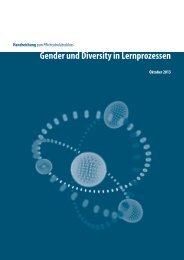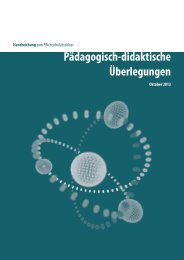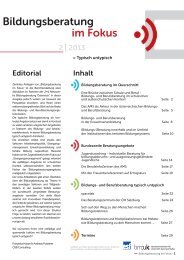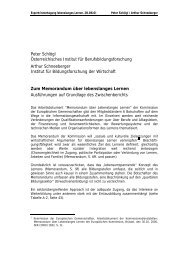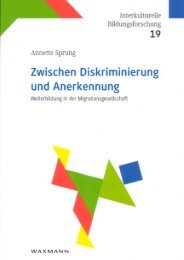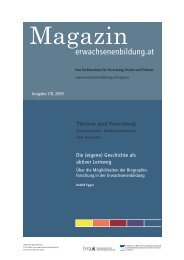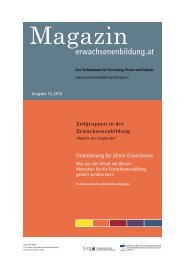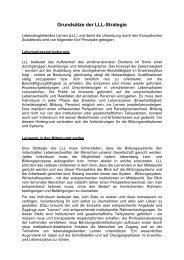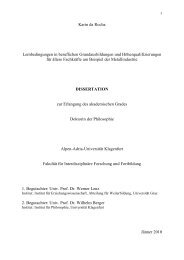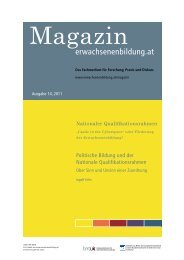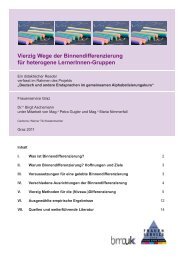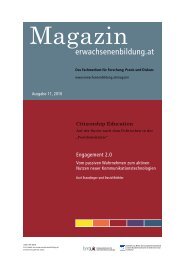eine zentrale Frage der Wissensvermittlung (pdf)
eine zentrale Frage der Wissensvermittlung (pdf)
eine zentrale Frage der Wissensvermittlung (pdf)
Sie wollen auch ein ePaper? Erhöhen Sie die Reichweite Ihrer Titel.
YUMPU macht aus Druck-PDFs automatisch weboptimierte ePaper, die Google liebt.
Zentrale <strong>Frage</strong>stellungen und Begriffe<br />
“Learning to write and read, to master the ‘graphic body’ is at best an introduction<br />
to the world of literacy. In learning to un<strong>der</strong>stand and to use written signs, children<br />
must learn to make distinctions which the culture as a whole took several millennia<br />
to produce. While it is true that children become literate not simply by being<br />
taught how to write and to read but by being raised in the universe of dis course<br />
of a literate culture, it is nonetheless the case that in becoming literate they are<br />
actively engaged in constructing their own theory of writing. For example, they<br />
entertain a series of hypothesis about how writing systems work, what words and<br />
names mean, and how they connect to the material and social world they live in.” 9<br />
Der literate Kosmos kann sich ihnen selbst bei hohem Geschick, bei Leichtigkeit <strong>der</strong> Aneignung,<br />
höchster Konzentration und entwickelter Neugier im Umgang mit dem Material sowie<br />
intensivem Üben dank guter Lehrangebote nicht auf einmal erschließen. Sie brauchen die<br />
Mög lichkeiten, in ihn hineinzuwachsen, mit <strong>der</strong> langen Geschichte <strong>der</strong> Herausbildung dieser<br />
Kultur bekannt und vertraut zu werden. So kann das Literate für sie zu <strong>eine</strong>r Umgebung<br />
werden, als Erfahrungsraum angeboten und zugänglich werden, in dem sie durch Entdecken,<br />
Experimentieren, Spekulieren und Spielen mit Ausdrucksmitteln und Techniken ausprobieren,<br />
wie sich Bedeutungen durch Sprechen, Denken o<strong>der</strong> Vorstellen verschieben lassen und<br />
ihnen neues Material und Mittel des Ausdrucks für ihre Bedürfnisse und ihre soziale Welt<br />
bieten.<br />
“The semiotic media of communication, thinking, and imagination have a decisive<br />
impact on the very content of communication, thinking, and imagination. Ulti mate -<br />
ly, every representation of a meaning leads to its recreation, every mediation of<br />
a meaning constitutes a new meaning.” 10<br />
Literarität als kulturelle Sozialisation ist ein <strong>zentrale</strong>s Thema <strong>der</strong> amerikanischen Soziologin<br />
und Bildungsforscherin Jenny Cook-Gumperz. Sie lehrt an <strong>der</strong> kalifornischen Universität<br />
Gevirtz Graduate School of Education und leitet dort das Department of Education. Einer<br />
ihrer Forschungsschwerpunkte ist die Soziolinguistik des Sprechens, Schreibens und Verstehens.<br />
Sie untersucht – auch in Klassenzimmern – vor allem mit qualitativen Methoden<br />
Interaktionsprozesse, um an ihnen herauszuarbeiten, wie Auffassungen über Sprache und<br />
Literarität soziokulturell wirksam werden.<br />
“Literacy, (thus), is usually taken to refer not only to the ability to un<strong>der</strong>stand<br />
written and printed inscriptions but also to the socio-cognitive changes that result<br />
from being literate, and from having a literate population. Yet, at the time, literacy<br />
connotes the assessment of the usefulness of this ability. We see that literacy<br />
cannot be judged apart from some un<strong>der</strong>standing of the social circumstances<br />
and specific historical traditions which affect the way literacy is conceived of in<br />
each society. When we investigate how schooling is used to achieve literacy we<br />
are drawn even more into making judgements about the values and opportunities<br />
that it brings about. Such a value-laden situation makes research on literacy and<br />
schooling an area that requires more than a simple descriptive account.” 11<br />
9 Ebd., S. 10.<br />
10 Brockmeier, Jens: The Literacy episteme: The rise and fall of a cultural discourse. In: Brockmeier/Wang/Olson 2002, S. 31.<br />
11 Cook-Gumperz, Jenny (Hrsg.): The Social Construction of Literacy. Cambridge 2006, S. 21.<br />
27



